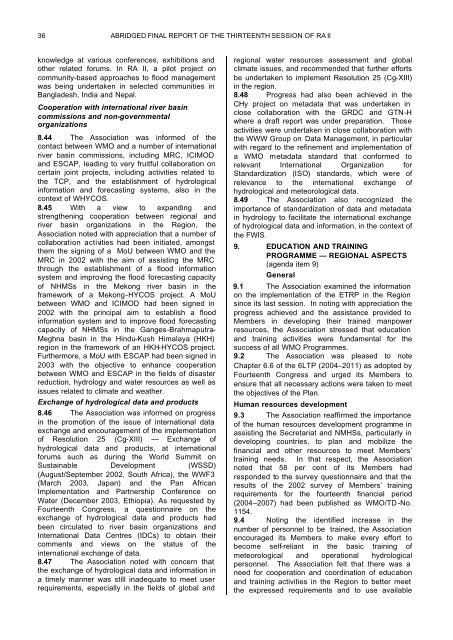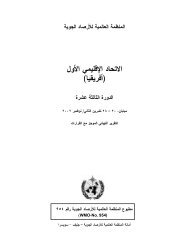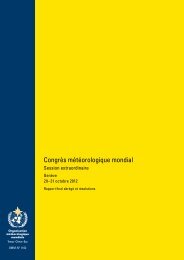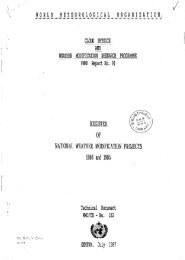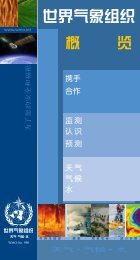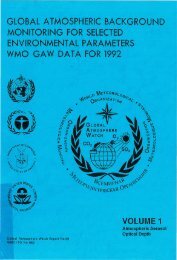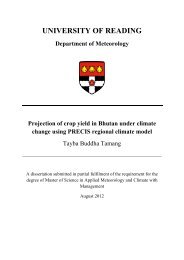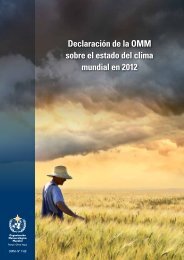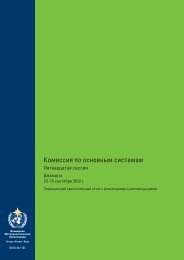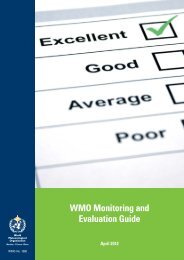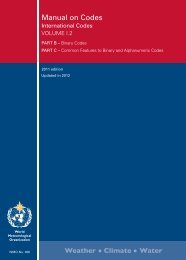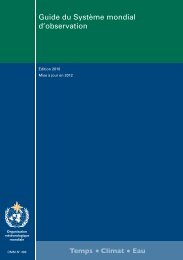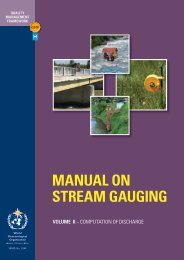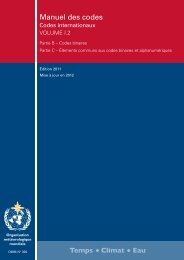Regional Association II (ASIA) - E-Library - WMO
Regional Association II (ASIA) - E-Library - WMO
Regional Association II (ASIA) - E-Library - WMO
Create successful ePaper yourself
Turn your PDF publications into a flip-book with our unique Google optimized e-Paper software.
36 ABRIDGED FINAL REPORT OF THE THIRTEENTH SESSION OF RA <strong>II</strong>knowledge at various conferences, exhibitions andother related forums. In RA <strong>II</strong>, a pilot project oncommunity-based approaches to flood managementwas being undertaken in selected communities inBangladesh, India and Nepal.Cooperation with international river basincommissions and non-governmentalorganizations8.44 The <strong>Association</strong> was informed of thecontact between <strong>WMO</strong> and a number of internationalriver basin commissions, including MRC, ICIMODand ESCAP, leading to very fruitful collaboration oncertain joint projects, including activities related tothe TCP, and the establishment of hydrologicalinformation and forecasting systems, also in thecontext of WHYCOS.8.45 With a view to expanding andstrengthening cooperation between regional andriver basin organizations in the Region, the<strong>Association</strong> noted with appreciation that a number ofcollaboration activities had been initiated, amongstthem the signing of a MoU between <strong>WMO</strong> and theMRC in 2002 with the aim of assisting the MRCthrough the establishment of a flood informationsystem and improving the flood forecasting capacityof NHMSs in the Mekong river basin in theframework of a Mekong-HYCOS project. A MoUbetween <strong>WMO</strong> and ICIMOD had been signed in2002 with the principal aim to establish a floodinformation system and to improve flood forecastingcapacity of NHMSs in the Ganges-Brahmaputra-Meghna basin in the Hindu-Kush Himalaya (HKH)region in the framework of an HKH-HYCOS project.Furthermore, a MoU with ESCAP had been signed in2003 with the objective to enhance cooperationbetween <strong>WMO</strong> and ESCAP in the fields of disasterreduction, hydrology and water resources as well asissues related to climate and weather.Exchange of hydrological data and products8.46 The <strong>Association</strong> was informed on progressin the promotion of the issue of international dataexchange and encouragement of the implementationof Resolution 25 (Cg-X<strong>II</strong>I) — Exchange ofhydrological data and products, at internationalforums such as during the World Summit onSustainable Development (WSSD)(August/September 2002, South Africa), the WWF3(March 2003, Japan) and the Pan AfricanImplementation and Partnership Conference onWater (December 2003, Ethiopia). As requested byFourteenth Congress, a questionnaire on theexchange of hydrological data and products hadbeen circulated to river basin organizations andInternational Data Centres (IDCs) to obtain theircomments and views on the status of theinternational exchange of data.8.47 The <strong>Association</strong> noted with concern thatthe exchange of hydrological data and information ina timely manner was still inadequate to meet userrequirements, especially in the fields of global andregional water resources assessment and globalclimate issues, and recommended that further effortsbe undertaken to implement Resolution 25 (Cg-X<strong>II</strong>I)in the region.8.48 Progress had also been achieved in theCHy project on metadata that was undertaken inclose collaboration with the GRDC and GTN-Hwhere a draft report was under preparation. Thoseactivities were undertaken in close collaboration withthe WWW Group on Data Management, in particularwith regard to the refinement and implementation ofa <strong>WMO</strong> metadata standard that conformed torelevant International Organization forStandardization (ISO) standards, which were ofrelevance to the international exchange ofhydrological and meteorological data.8.49 The <strong>Association</strong> also recognized theimportance of standardization of data and metadatain hydrology to facilitate the international exchangeof hydrological data and information, in the context ofthe FWIS.9. EDUCATION AND TRAININGPROGRAMME — REGIONAL ASPECTS(agenda item 9)General9.1 The <strong>Association</strong> examined the informationon the implementation of the ETRP in the Regionsince its last session. In noting with appreciation theprogress achieved and the assistance provided toMembers in developing their trained manpowerresources, the <strong>Association</strong> stressed that educationand training activities were fundamental for thesuccess of all <strong>WMO</strong> Programmes.9.2 The <strong>Association</strong> was pleased to noteChapter 6.6 of the 6LTP (2004–2011) as adopted byFourteenth Congress and urged its Members toensure that all necessary actions were taken to meetthe objectives of the Plan.Human resources development9.3 The <strong>Association</strong> reaffirmed the importanceof the human resources development programme inassisting the Secretariat and NMHSs, particularly indeveloping countries, to plan and mobilize thefinancial and other resources to meet Members’training needs. In that respect, the <strong>Association</strong>noted that 58 per cent of its Members hadresponded to the survey questionnaire and that theresults of the 2002 survey of Members’ trainingrequirements for the fourteenth financial period(2004–2007) had been published as <strong>WMO</strong>/TD -No.1154.9.4 Noting the identified increase in thenumber of personnel to be trained, the <strong>Association</strong>encouraged its Members to make every effort tobecome self-reliant in the basic training ofmeteorological and operational hydrologicalpersonnel. The <strong>Association</strong> felt that there was aneed for cooperation and coordination of educationand training activities in the Region to better meetthe expressed requirements and to use available


